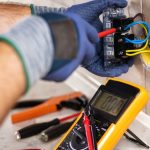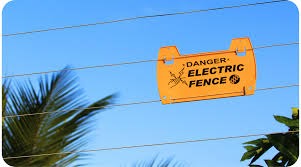Electrical Inspections - COC
The Electrical Inspection is by far the most complicated of the five involving not just an entire book of regulations SANS 10142 -1:2024, but also includes the occupational health and safety act, and of course these regulations change from time to time.
INSPECTIONS AND COC
The first thing to know is that this certificate covers the electrical “installation” from the point where the mains supply cable enters the premises, generally the top of the Main Switch to the point of consumption, generally described as a plug socket or where the wires connect to a fixed appliance. The certificate does NOT include appliances fixed or free standing, only the correctness of how these devices are connected to the installation. Fixes appliances include things like, stove, geyser, pool & pond pumps, aircon units, garage and gate motors, pool lights etc. The electrical regulation is primarily concerned with correctness and safety of your electrical Installation and that everything that forms part of the installation is in good working order.
The Electrical Inspection is by far the most complicated of the three involving not just an entire book of regulations, SANS10142-1: 2024, but also includes the occupational health and safety act.
This certificate covers the electrical “installation” from the point where the mains supply cable enters the premises, generally the top of the Main Switch to the point of consumption, generally described as a plug socket or where the wires connect to a fixed appliance.
The certificate does NOT include appliances fixed or free standing, only the correctness of how these devices are connected to the installation. Fixed appliances include things like, stove, geyser, pool & pond pumps, aircon units, garage and gate motors, pool lights etc.
The electrical regulation is primarily concerned with correctness and safety of your electrical Installation and that everything that forms part of the installation is in good working order.
We inspect the following Electrical items:
⦁ The mains boards, correct connections, correct cable sizes, correct circuit breakers and labelling, Earth leakage operation. That all items and covers are properly secured etc
⦁ Check that all plugs and switches work correctly with no worn contacts, are wired correctly, secure, and if metal are correctly bonded/Earthed
⦁ All fixed appliances, including lights that have exposed metal need to be earthed correctly.
⦁ Ensure that all fixed appliances have been connected to the installation by approved means, which varies depending on the type of appliance and the current it draws.
⦁ We do an insulation test, PSC, Loop & Voltage tests.
⦁ Check all wiring to ensure it’s correctly rated, colour coded correctly and the correct type for its application.
⦁ Each room must have at least one working light, and the correct type for the room it is in, enclosed light fittings in bathrooms.
⦁ We check to make sure that no electrical points, switches or lights are in illegal positions, not close to shower, baths, pools, etc.
⦁ We need to ensure that all devices in the installation are correctly rated, installed and of approved types.
⦁ Even temporary installations, which have been installed in a manner that would imply they are permanent, need to comply with regulations. You cannot extend the lead on a fixed appliance to the nearest plug point you must extend the plug circuit to the appliance.
Our Electrical division specializes in all electrical services or any of your electrical requirements
We do all electrical work for Residential, Commercial and Industrial from lighting to power planning.
We also do general electrical work such as the repair of stoves, electrical wiring for home renovations as well electrical certificates:
⦁ Domestic Work
⦁ DB Boards Rewiring
⦁ Generator & UPS Change over Switches
⦁ Electrical Maintenance
⦁ General Electrician
⦁ Lighting or Low Energy upgrades & Installations
⦁ Rewiring
⦁ Wiring of Houses and Buidlings
⦁ Generator Sales and installations
⦁ Industrial Electrical Maintenance
⦁ Streetlights installations and maintenance
⦁ Wiring of facilities
⦁ Medium to low Voltage Systems
⦁ Generator Back up power
⦁ Change over switching for generators
⦁ Inverter Back up power
⦁ UPS Back up power
⦁ Plugs, sockets and lights
⦁ Cabling and Trunking
⦁ Installation & Wiring of Single phase DB Boxes
⦁ Installation & Wiring of 3(Three) phase DB Boxes
⦁ Installation of wire ways (Steel, PVC & Trunking)
⦁ Installation & Wiring of plug sockets and light switches
⦁ Installation & Wiring of lights (Florescent, Down Lighters & Transformers)
⦁ Installation & Wiring for 220V & 380V motors
⦁ Installation & Wiring of Geyser elements & Thermostats
⦁ Installation & Wiring of gate motors, Stove Isolators, Isolators for Air-Conditioners, Cold rooms & Freezer rooms, Timers
⦁ Installation & Wiring of Star/Delta Motors
⦁ Installation & Wiring od Industrial Switch gear
⦁ Installation & Wiring of two way light switching & Intermediate switching
⦁ Installation, jointing and termination of Medium Voltage and Low Voltage cables
⦁ Inspection of facilities and issuing of Certificates of Compliance (COC) - (Domestic, Commercial & Industrial)
⦁ Solar Energy
⦁ New Electrical Installations (Domestic, Commercial & Industrial)
⦁ Electrical turnkey projects
⦁ Lightning protection
Security lighting/ automated
⦁ LED lighting
⦁ Energy saving audits
⦁ Alternative power – Inverters – solar
⦁ Power/ elect bill reductions ⦁ Power saving installations⦁ Energy saving programme.
⦁ All installations comply with ECA and SABS 10142-1:2024 regulations ⦁ Emergency Lighting
Requirements for a valid solar CoC
- Issued by a qualified electrician: Only a registered Installation Electrician (IE) or Master Installation Electrician (MIE) can legally issue a CoC for a solar PV system.
- Based on a valid existing CoC: A supplementary CoC for a solar installation can only be issued if the property already has a valid Initial electrical CoC for the entire premises.
- Accompanied by a test report: The CoC document must be supported by a test report that details the inspection and tests performed on the system.
Importance of a Solar CoC
- Grid connection and permits: If your system is connected to the grid, you will need a CoC to get approval from your municipality or Eskom.
- Legal protection: The CoC protects the homeowner from liability in the event of an electrical incident caused by the installation.
- Proof of quality: It ensures the system was installed by a qualified professional according to established safety standards.
The electrical compliance process in South Africa
- Select a registered electrician:Find a qualified and registered electrician who holds a valid wireman's license from the Department of Labour and is a member of a recognised body like the Electrical Contractors Association (ECA) or Electrical Contractors Board(ECB)
- Schedule an inspection: The electrician will perform a thorough inspection and testing of your property's entire electrical installation.
- Receive a repair quotation: If the electrician finds faults during the inspection, they must issue a written report and a quotation for the repairs needed to achieve compliance.
- Approve repairs: You must approve the quotation for repairs. According to the law, the electrician who performs the inspection must correct any non-compliant issues before issuing a new CoC.
- Complete the repairs: The electrician will carry out the necessary repair work. This can include anything from fixing loose connections and replacing faulty switches to upgrading the distribution board or replacing outdated wiring.
- Receive the CoC: Once all repairs are finished and the installation meets safety standards, the electrician will issue the official Electrical Certificate of Compliance.
- Register the CoC: The electrician will register the CoC with the Electrical Conformance Board of South Africa (ECB).
Typical repairs required for a COC
- Checking earth leakage: Ensuring the earth leakage unit is correctly fitted to the main fuse box and is functional.
- Checking earthing and bonding: Verifying that all electrical systems and exposed metal parts are correctly earthed and bonded to prevent shocks.
- Replacing damaged components: Replacing any worn-out, damaged, or deteriorated electrical items, such as sockets, switches, or light fittings.
- Inspecting the main switch: Confirming that the electrical main switch is compliant with current regulations.
- Addressing wiring issues: Checking the wiring system for safety and ensuring that older, non-compliant cables (like those covered in rubber, lead, or fabric) are replaced.
- Labeling and safety signage: Ensuring that the distribution board is adequately labelled and has the correct warning signs.
- Checking circuit breakers: Verifying that all circuit breakers are of the correct size and are operating correctly to prevent overloads.
Costs and what to expect
- Initial inspection fee: Most electricians charge a call-out fee for the initial inspection, which ranges from R1,150 to R4,500 depending on the property's size and complexity.
- Repair costs: The cost of repairs is in addition to the inspection fee. Minor repairs can range from R1,000 to R6,000, while major work like a distribution board upgrade or rewiring can cost R6,000 or more.
- Multiple quotes: It is advisable to get multiple quotations from accredited professionals before committing to any repairs, as prices can vary widely.
- No "cheap" COCs: Be wary of contractors who offer to issue a COC without a proper inspection and repairs. This is illegal and compromises your safety.
Validity of a Electrical COC
- A Electrical COC is valid for two years from the date of issue, provided no alterations or additions are made to the electrical installation.
- Any new electrical work, even adding a single plug point, requires a supplementary COC to be issued by a registered electrician.
- Insurance coverage: Many insurance companies require a valid COC. Without one, your claim could be rejected if the solar system is damaged or causes a fire.




